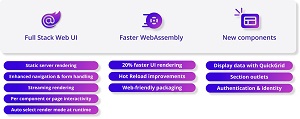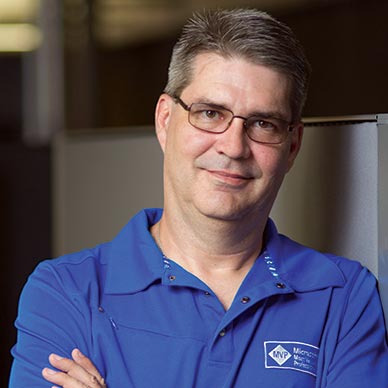News
Full Stack Hands-On Development with .NET
In the fast-paced realm of modern software development, proficiency across a full stack of technologies is not just beneficial, it's essential. Microsoft has an entire stack of open source development components in its .NET platform (formerly known as .NET Core) that can be used to build an end-to-end set of applications. This includes Entity Framework (EF) Core, ASP.NET Core MVC, ASP.NET Core Razor Pages, ASP.NET Core RESTful services and Blazor.
 [Click on image for larger view.] Blazor in .NET 8 (source: Microsoft).
[Click on image for larger view.] Blazor in .NET 8 (source: Microsoft).
Getting a handle on all of these technologies to build different kinds of applications can be a daunting task, and certainly not something that can be covered in a a single session at a developer conference, for example, or even a one-day training seminar.
Four days is more like it, and that's just how long Philip Japikse, an international keynote speaker, author, Microsoft MVP and Professional Scrum Trainer holding PSM II, PSD, PSPO and PSK certifications, is going to devote to educate and guide developers in a virtual hands-on training seminar titled "Full Stack Hands-On Development with .NET (Core)" set for July 16-19.
Attendees are promised to learn all that there is to know when using the .NET stack to build web applications, including:
- How to build a data access layer with Entity Framework Core and SQL Server
- How to build ASP.NET Core RESTful services
- How to build Web Applications using ASP.NET Core MVC and Razor Pages
- How to build single-page applications using Blazor WebAssembly
We caught up with Japikse to get a preview of what attendees can expect from the seminar, and how it will help them build a solid foundation in full-stack development with .NET in a short Q&A.
VisualStudioMagazine: Given the rapidly evolving tech landscape, how does the seminar plan to keep the content current and relevant, especially concerning .NET 8 and C# 12 updates?
Japikse: I keep the content and the labs current through a lot of time and hard work. All of the content and labs were created by me so it's up to me to keep them current. Being a Microsoft MVP certainly helps keep everything current and relevant, as MVPs have access to the product teams, and we get to see the direction the products are going. While I can't reveal any NDA information, the insight provided by this level of access helps guide my updates throughout the release cycle.
Can you elaborate on how this seminar's approach to hands-on learning with .NET (Core) differs from traditional classroom-based instruction or online tutorials?
The biggest difference in my workshop is that it is both. We spend the morning in lectures, learning the material, and then every afternoon is spent doing hands-on labs that reinforce the material from the morning. Each successive day builds on the previous. Online tutorials are usually lab-based, but you don't have synchronous access to the instructor. Classroom-based instruction usually doesn't have a hands-on component that is done in real-time with the instructor in the room.
Another big difference in my workshop is that we are building working applications, not just different code samples.
 "At the end of the four days, you will have two traditional web applications (ASP.NET Core using MVC and ASP.NET Core using Razor Pages), a RESTful service built using ASP.NET Core, a Blazor WASM SPA application, and a data access layer built using Entity Framework Core."
"At the end of the four days, you will have two traditional web applications (ASP.NET Core using MVC and ASP.NET Core using Razor Pages), a RESTful service built using ASP.NET Core, a Blazor WASM SPA application, and a data access layer built using Entity Framework Core."
Philip Japikse, international keynote speaker, author and Microsoft MVP
At the end of the four days, you will have two traditional web applications (ASP.NET Core using MVC and ASP.NET Core using Razor Pages), a RESTful service built using ASP.NET Core, a Blazor WASM SPA application, and a data access layer built using Entity Framework Core.
How will the seminar address the challenges developers face when transitioning from older .NET frameworks to .NET (Core) for full-stack development?
For those developers coming from ASP.NET WebAPI or ASP.NET MVC, this will teach them the ASP.NET Core versions. For developers using ASP.NET WebForms, this will teach them alternatives, including Blazor, Microsoft's recommended replacement for WebForms.
The seminar deals with MVC, Razor Pages and Blazor for web application development. How should developers decide which approach to follow, and what unique benefits does each approach offer?
This workshop is designed to have the attendees build the same application using all the frameworks: MVC, Razor Pages, and Blazor. Not just one or the other. The only real choice is if they use MVC or Razor Pages first. The expectation is that they will then build the other version next, finishing with Blazor WASM.
The reason they are building the same application three times is to answer your exact question and demonstrate the differences, pros, and cons of the frameworks. They will then be able to determine which framework (or frameworks) is (are) best for their own situation.
RESTful services are crucial for modern web applications. How will the seminar's content ensure attendees are equipped to implement these effectively within their projects?
In this training, we build a full ASP.NET Core RESTful service, complete with versioning and documentation. All of the architecture that I show in this workshop (not just for the service, but all applications and the data access layer) is a subset of what I use in my full-time job as CTO and Chief Architect. It's not the complete architecture (you would need to work for me to get everything), but it's a solid foundation for enterprise software development.
Note: Those wishing to attend the training seminar can save hundreds of dollars by registering early according to the event's pricing info. "Register for the seminar by June 21 to save $200 and secure your place for intensive four-day developer training," said the organizer of the event, which is being presented by the parent company of Visual Studio Magazine.
About the Author
David Ramel is an editor and writer at Converge 360.